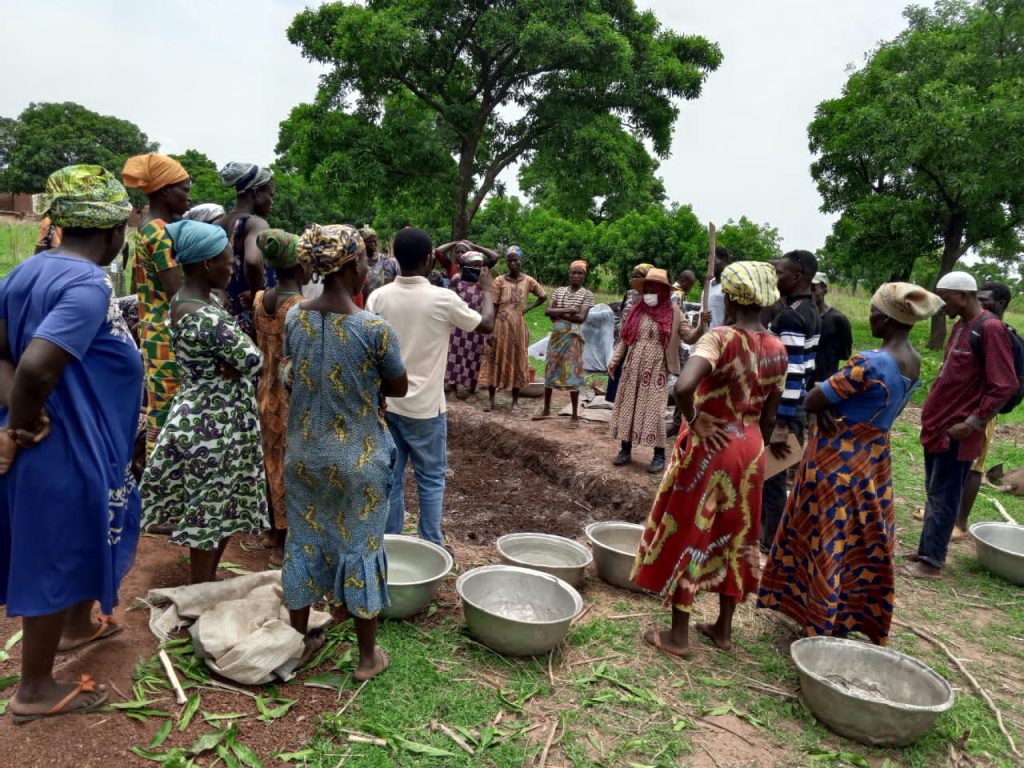By Philip Tengzu
Balazu, (UW/R), May 17, GNA – The Council for Scientific and Industrial Research of the Savannah Agricultural Research Institute (CSIR-SARI) has encouraged smallholder farmers, particularly women to adopt the use of compost and biochar in their farming activities.
It said the two technologies would save farmers from the excessive cost of buying chemical fertilizer for their fields, enhance the soil structure and texture and improve crop yield.
The CSIR-SARI was training smallholder farmers, mostly women in northern Ghana on compost and biochar production with four communities in the Upper West Region – Balazu, and Zinye communities in the Wa East District and Nimbare and Boi communities in the Jirapa Municipality benefiting.
While compost is a mixture of decomposed organic materials including animal droppings to produce manure, biochar is a carbon-rich organic matter produced under pyrolysis – burning organic materials without oxygen.
About 120 smallholder farmers, mostly women in the four communities, participated in the intensive and practical biochar and compost preparation training.
Speaking to farmers at the Balazu and Zinye communities during the training, Mr Alhassan Nuhu Jinbaani, an Agricultural Economist at the CSIR-SARI, Nyankpala, said the training formed part of a project that sought to promote Bambara groundnut cultivation among smallholder farmers.
Grow Further, a USA-based organisation is funding the three-year project, titled: “Promoting Bambara groundnuts production, adoption and utilization for food and nutrition security and increased income for smallholder farmers in northern Ghana” and implemented by the CSIR-SARI.
It was aimed at improving food and nutrition security, climate adaptation and increased income among smallholder farmers through cultivating and utilising Bambara groundnut.
Mr Jinbaani, the project’s Principal Investigator, explained that there was currently no improved variety of Bambara groundnut compared to other crops such as maize, rice and sorghum.
He observed that studies showed declining soil fertility in northern Ghana but there were no technologies extended to farmers as far as improving soil fertility was concerned.
He said that informed their decision to train smallholder farmers on biochar and compost preparation as viable options for improving their soil fertility.
Mr Jinbaani indicated that preparing biochar and compost depended on local materials and it was less time-consuming compared to travelling long distances to buy chemical fertilizer.
Madam Rashidatu Abdulai, a Soil Scientist and Assistant Research Scientist with the CSIR-SARI, Nyankpala, said the training targeted women smallholder farmers since they were saddled with unproductive lands coupled with financial constraints in buying chemical fertilizer for their farms.
“A lot of women cultivate bambara groundnuts and mostly the men leave the lands that are less fertile for them and because bambara groundnut is resilient, it can do well on those lands”, Madam Abdulai explained.
She took the farmers through step-by-step processes of compost and biochar preparation.
Mr Godwin Opoku, a Soil Scientist with the CSIR-SARI, Wa station, said soil nutrient analysis conducted in the Upper West Region over the years showed declining soil nutrients, which called for efforts to improve the soil to support crop production.
He explained that using biochar as a soil amendment would help improve the soil nutrients and restore degraded soil.
“Biochar has the ability to make the soil porous, it can retain soil nutrients and reduce nutrient loss through leaching and also bind soil particles”, Mr Opoku said.

On his part, Mr Hashim Ibrahim, a Biometrician with the CSIR-SARI, Wa station, said using biochar and compost for farming was economical compared to the use of chemical fertilizers.
He said with the high cost of fertilizer in recent times, using biochar and compost to cultivate was less costly and could produce more yield and advised the women to take advantage of those technologies.
Some of the beneficiaries who spoke to the Ghana News Agency, thanked the CSIR-SARI and its partners for the intervention since it would take off their burden of struggling to get fertilizer for their crops.
Madam Rebecca Vitus, a beneficiary at Balazu community said, “It will help me a lot because I find it difficult getting fertilizer, so with this, I will not have to worry about getting money to buy fertilizer.”
Madam Bonti Bayor, also a beneficiary from Zinye, said with the biochar and compost, she could improve her crop yield including vegetables.
GNA